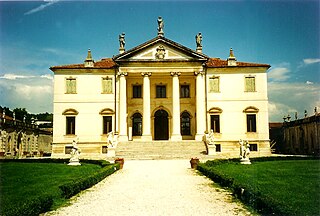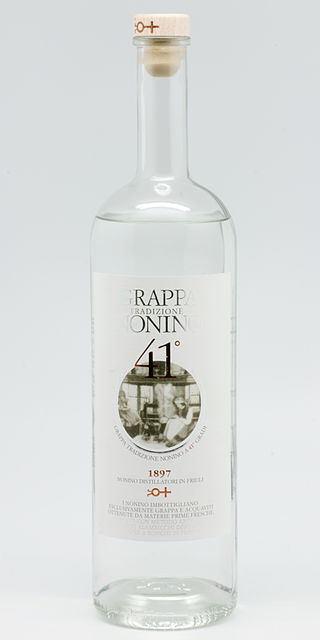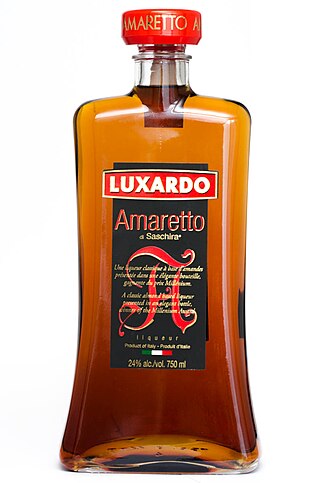
Maraschino is a liqueur obtained from the distillation of Marasca cherries. The small, slightly sour fruit of the Marasca cherry tree, which grows wild along parts of the Dalmatian coast in Croatia, lends the liqueur its unique aroma.

Bassano del Grappa is a city and comune, in the Vicenza province, in the region of Veneto, in northern Italy. It bounds the communes of Cassola, Marostica, Solagna, Pove del Grappa, Romano d'Ezzelino, Campolongo sul Brenta, Conco, Rosà, Cartigliano and Nove. Some neighbourhoods of these communes have become in practice a part of the urban area of Bassano, so that the population of the whole conurbation totals around 70,000 people.

Grappa is an alcoholic beverage: a fragrant, grape-based pomace brandy of Italian origin that contains 35 to 60 percent alcohol by volume. Grappa is a protected name in the European Union.

The province of Vicenza is a province in the Veneto region of Italy. Its capital city is Vicenza.

Jacopo Bassano, known also as Jacopo dal Ponte, was an Italian painter who was born and died in Bassano del Grappa near Venice, and took the village as his surname. Trained in the workshop of his father, Francesco the Elder, and studying under Bonifazio Veronese in Venice, he painted mostly religious paintings including landscape and genre scenes. He often treated biblical themes in the manner of rural genre scenes, portraying people who look like local peasants and depicting animals with real interest. Bassano's pictures were very popular in Venice because of their depiction of animals and nocturnal scenes. His four sons: Francesco Bassano the Younger, Giovanni Battista da Ponte, Leandro Bassano, and Girolamo da Ponte, also became artists and followed him closely in style and subject matter.

Francesco Bassano the Younger, also called Francesco Giambattista da Ponte or Francesco da Ponte the Younger, was an Italian painter of the Renaissance period.
Rosà is a town of 14,328 inhabitants in the province of Vicenza, Veneto, Italy. The name comes from the Latin word "roxata", the ancient name of the biggest irrigation channel that passed in that area. The municipality incorporates 4 hamlets. Rosà is officially European Town of Sport 2011.

Possagno is a comune in the Province of Treviso, in the Italian region Veneto. It is located about 60 kilometres (37 mi) northwest of Venice and about 35 kilometres (22 mi) northwest of Treviso. As of 31 August 2021, it had a population of 2,215 and an area of 12.1 square kilometres (4.7 sq mi).

A microdistillery is a small, often boutique-style distillery established to produce beverage grade spirit alcohol in relatively small quantities, usually done in single batches. While the term is most commonly used in the United States, micro-distilleries have been established in Europe for many years, either as small cognac distilleries supplying the larger cognac houses, or as distilleries of single malt whisky originally produced for the blended Scotch whisky market, but whose products are now sold as niche single malt brands. The more recent development of micro-distilleries can now also be seen in locations as diverse as London, Switzerland, and South Africa.
Davide Campari-Milano N.V., trading as Campari Group, is an Italian company active since 1860 in the branded beverage industry. It produces spirits, wines, and non-alcoholic apéritifs. From its signature product, Campari, its portfolio has been extended to include over 50 brands, including Aperol, Appleton, Cinzano, SKYY vodka, Espolón, Wild Turkey, Grand Marnier, and Forty Creek whisky.
Poli Distillerie is an artisan Grappa distillery solely owned by the Poli family, founded in 1898 in Schiavon, near Bassano del Grappa, in the heart of Veneto, Italy. The distillery is currently run by Jacopo Poli together with his siblings Giampaolo, Barbara and Andrea.

Nonino is a small Italian company that is a producer of grappa. Nonino is also the name of the family that owns and runs the brand Nonino Grappa. The first Nonino distillery was founded by Orazio Nonino in Ronchi di Percoto, Pavia di Udine, in the Friuli region in northeastern Italy, in 1897.

Leandro Bassano, also called Leandro dal Ponte, was an Italian artist from Bassano del Grappa who was awarded a knighthood by the Doge of Venice. He was the younger brother of artist Francesco Bassano the Younger and third son of artist Jacopo Bassano. Their father took his surname from their town of Bassano del Grappa, and trained his sons as painters.

Bortolo Nardini is an Italian family-owned producer of alcoholic drinks, notably grappa. Founded in 1779 and based in Bassano del Grappa, the company produces four million bottles of grappa per year - over a quarter of the world market - making it the brand leader in this area.

Girolamo Luxardo S.p.A. is an Italian liqueur factory. Founded in Zara, it moved to Torreglia near Padua after 1945.
The Marzadro Distillery is an Italian family run company created at the end of World War II. Its birth and evolution follows closely the economic transformation of Italy and the modernization of its means of production, in particular in the Northern part of the country. The company is located in the historical region for the production of grappa. Together with other distilleries in the regions of Trentino, Veneto, Friuli, Piemonte and Lombardia has made important contributions that have changed the character of this liquor from an ammazzacaffè to a liquor worthy of international recognition. Initially, the distillery operated only locally, distilling pomace to produce grappa and other liquor. Currently it benefits from a national and international network of distribution.

Annandale distillery is a whisky distillery producing single malt Scotch whisky in Annan, Dumfries and Galloway, Scotland.

The Trento–Venice railway is an Italian state-owned railway line connecting Trento, in Trentino-Alto Adige, to Mestre, a suburb of Venice, in the Veneto region. At Mestre, it connects to the main line from Verona.
The Venetian army was the army of the city-state of Venice, and later of the Republic of Venice and its dominions. During the Republic's early centuries, it was a force comprising an urban militia.
Luigi Fabris was an Italian sculptor and ceramist.













